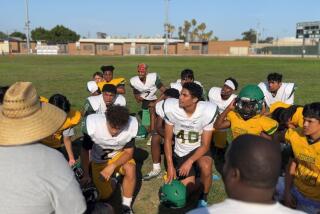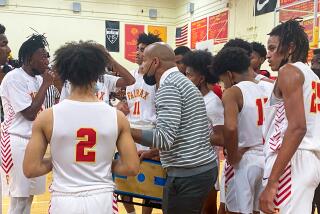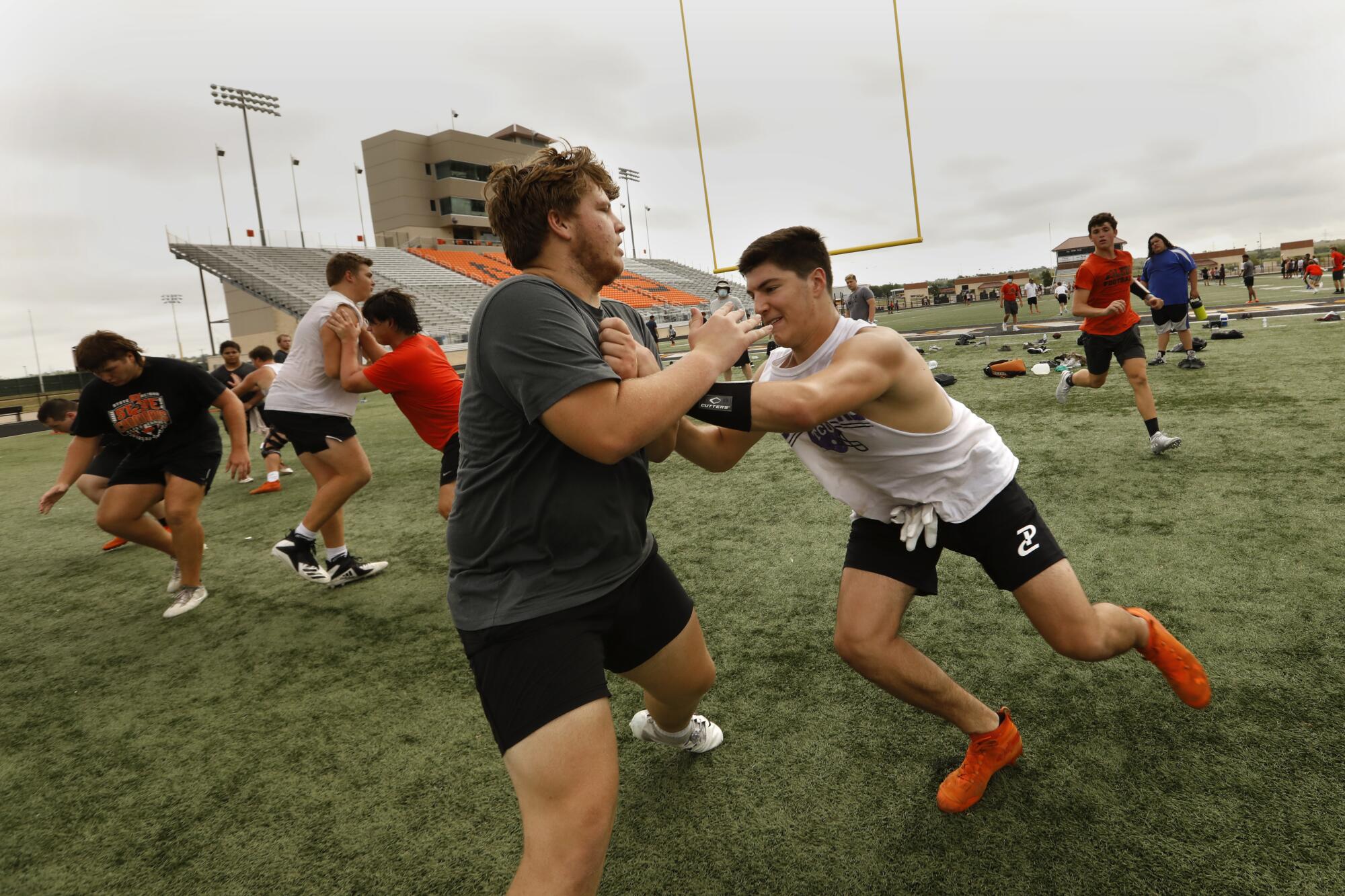
- Share via
Aledo, Texas — In this town of 4,600, home to the Bearcats and a well of pride that has withered lesser teams, Tim Buchanan, a.k.a. Coach Buc, watched his players arrive at the stadium before first light. It is like this every year: cleats hitting turf, shouted drills and the promise of another state title in December.
Aledo has come to expect this. The Bearcats have won a record nine championships, most recently last year. They are the town’s joy and occasional agony, the reason business slows Fridays as residents — even those without a child on the team — swagger into the 9,000-seat stadium. But as players took the field this week, they heard an unlikely command from Coach Buc:
“Cover that nose up!”
Those words didn’t sound natural echoing out over the artificial turf, but this pandemic season of face masks, social distancing and temperature checks is changing — perhaps even endangering — the hallowed rhythms of Texas football. College scholarships, bragging rights and futures hang in the balance, to say nothing of mascots and autumn romances.
“I was nervous we weren’t going to play,” said Jaedon Pellegrino, 18, a senior and wide receiver whose younger brother is a teammate and whose family moved to Aledo from Yorba Linda about six years ago.
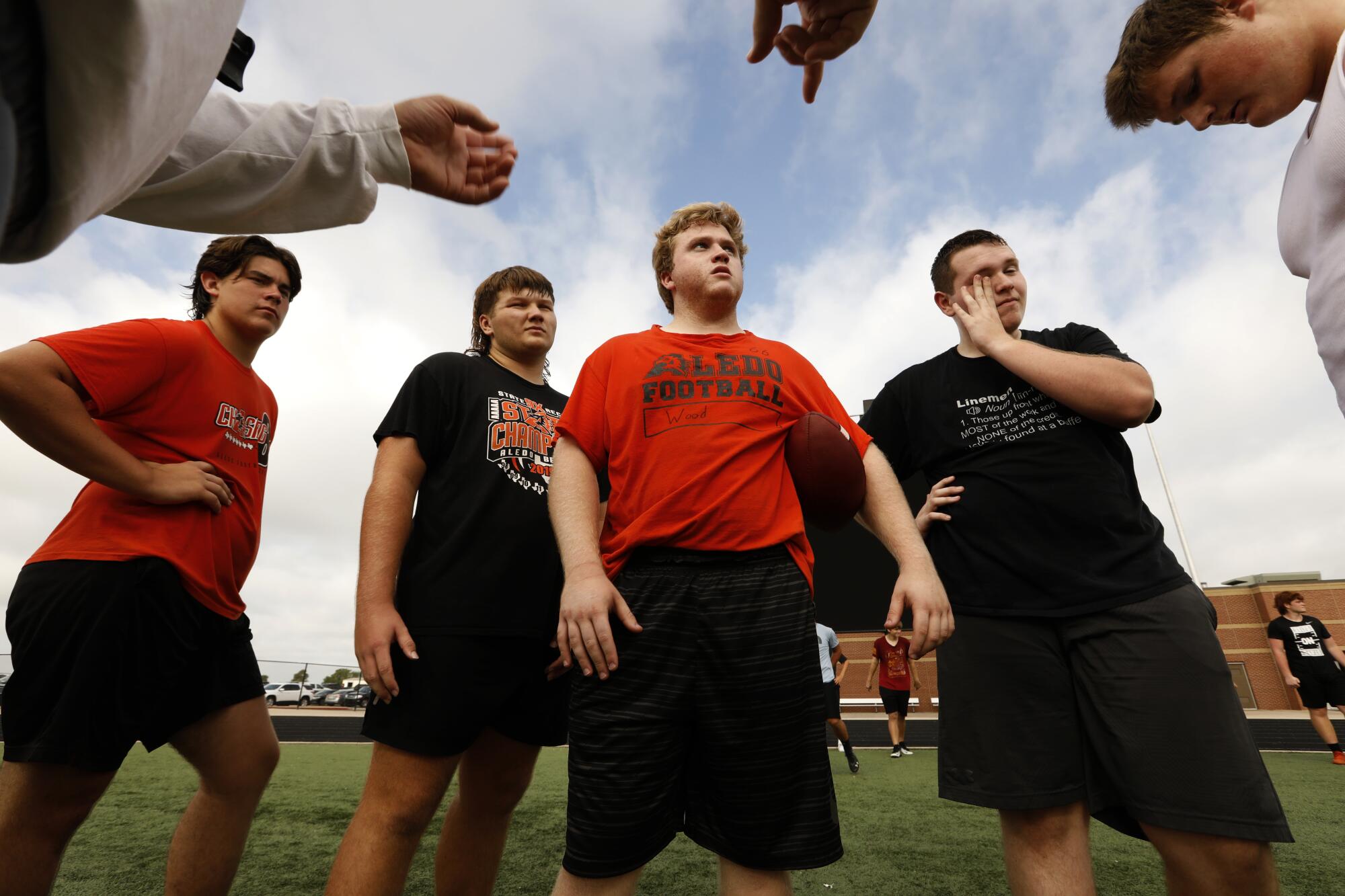
As debate raged nationwide over whether and how schools will resume, some states canceled high school football or, like California, postponed it until winter. Texas Gov. Greg Abbott has pushed for classes to start next month, and although some local health authorities have refused, football will return. As Hall of Fame Cowboys Coach Tom Landry said, “Football is to Texas what religion is to a priest,” and nothing is as revered as the high school version made famous by “Friday Night Lights.”
To save the season, rules have been adjusted, schedules altered. Texas leads the nation in high school football participation, with about 170,000 players, plus associated cheer squads and marching bands like Aledo’s award-winning Bearcat Regiment. It could all be imperiled if players start testing positive for the coronavirus.
“They did a great job of putting together a plan to try to give us a chance,” Buchanan said. “... I honestly think our kids are safer at school and when they’re at practice because we’re going to make them social distance and follow the guidelines.”
Last week, officials announced that full-contact practices with helmets and pads for about 500 large schools like Aledo — which has roughly 1,900 students, including 250 football players — would be delayed until Sept. 7. The team’s first game against neighboring Weatherford was pushed back to Sept. 25 and the state championship – usually held before Christmas - was moved to January.
The league also imposed new pandemic training, travel and seating rules. Buses can only ferry two dozen students at a time, meaning Aledo will have to double its fleet for games to a half-dozen, plus band and cheer teams.

The coronavirus era of social distancing and temperature checks is changing, perhaps even endangering, the hallowed rhythms of Texas football.
Stadiums will be limited to half capacity, and those who attend must wear masks. That’s a big deal in towns like Aledo, where the $11-million Bearcat Stadium complex is routinely packed and officials still hadn’t decided this week how to distribute tickets. A couple thousand fans also travel to attend away games.
The pandemic has reshaped this year’s football season in other ways too. Aledo is scheduled to start school Aug. 19, and this week gave students the option to attend classes remotely or in person. But as COVID hospitalizations and deaths spiked across Texas this month, several large districts delayed reopening and with it football, including Aledo’s competitors in neighboring Tarrant County and to the south at Fort Bend Marshall, who they beat in the state championship last year.
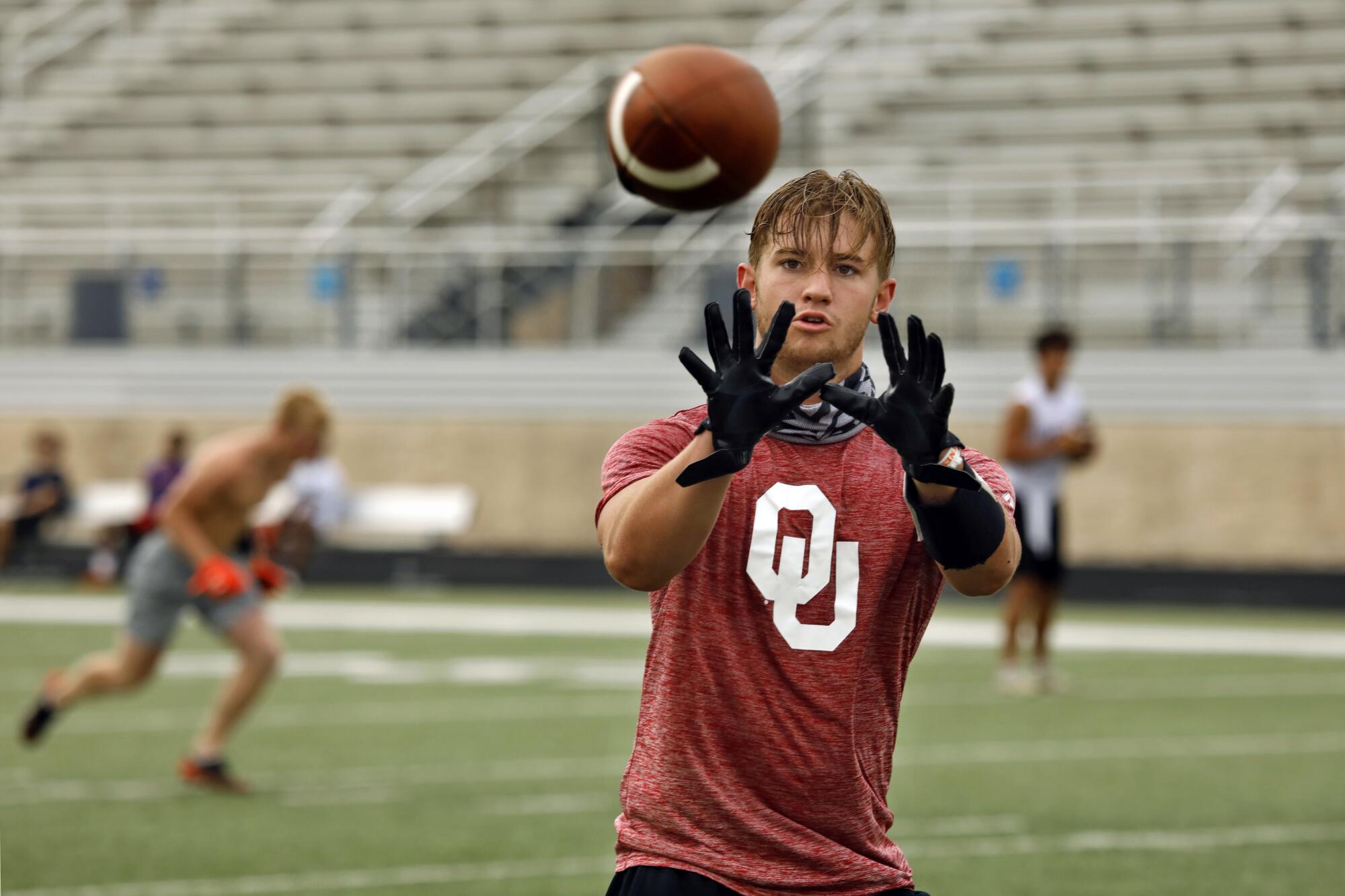
Since Texas allowed on-campus strength and conditioning workouts last month, more than 200 schools have suspended workouts due to the virus. Some teams have added protective equipment, including helmet face shields. Buchanan opted against the shields, which he said could fog up and dislodge during play in Texas’ triple- digit heat.
But he planned to order hundreds of orange and black Bearcat gator face coverings this week with players’ numbers emblazoned on them. He hopes that delaying full-contact practices until next month will prevent players from becoming infected.
“Hopefully it won’t create more illnesses,” he said.
Buchanan, 60, has coached at Aledo since 1993. He’s diabetic, which puts him at added risk of contracting the virus. He’s careful to wear a mask and to keep his distance from players while running drills.
“When kids come up to shake my hand, I back away,” he said.
This town depends on Buchanan and the team he built to light up the scoreboard and carry it through the toughest bust Texas has seen. Aledo is one of more than a hundred Dallas-Fort Worth oil-dependent suburbs stunned by the economic downturn that has accompanied the pandemic.
Under the new rules, if a player is exposed to someone with COVID, shows symptoms or tests positive, they have to stop playing until they pass a medical screening. Aledo’s rules are even stricter. Last week, an Aledo player who tested positive had to self quarantine for two weeks, along with his weight-lifting partner. Several others have already had to stay home from practice because they were exposed to relatives who tested positive.
Senior Sam Forman, 18, a middle linebacker, sat out of practice after his 16-year-old cousin, who lives nearby, tested positive two weeks ago. Forman never had symptoms, and said his cousin — who plays football for a school in Fort Worth — has recovered.
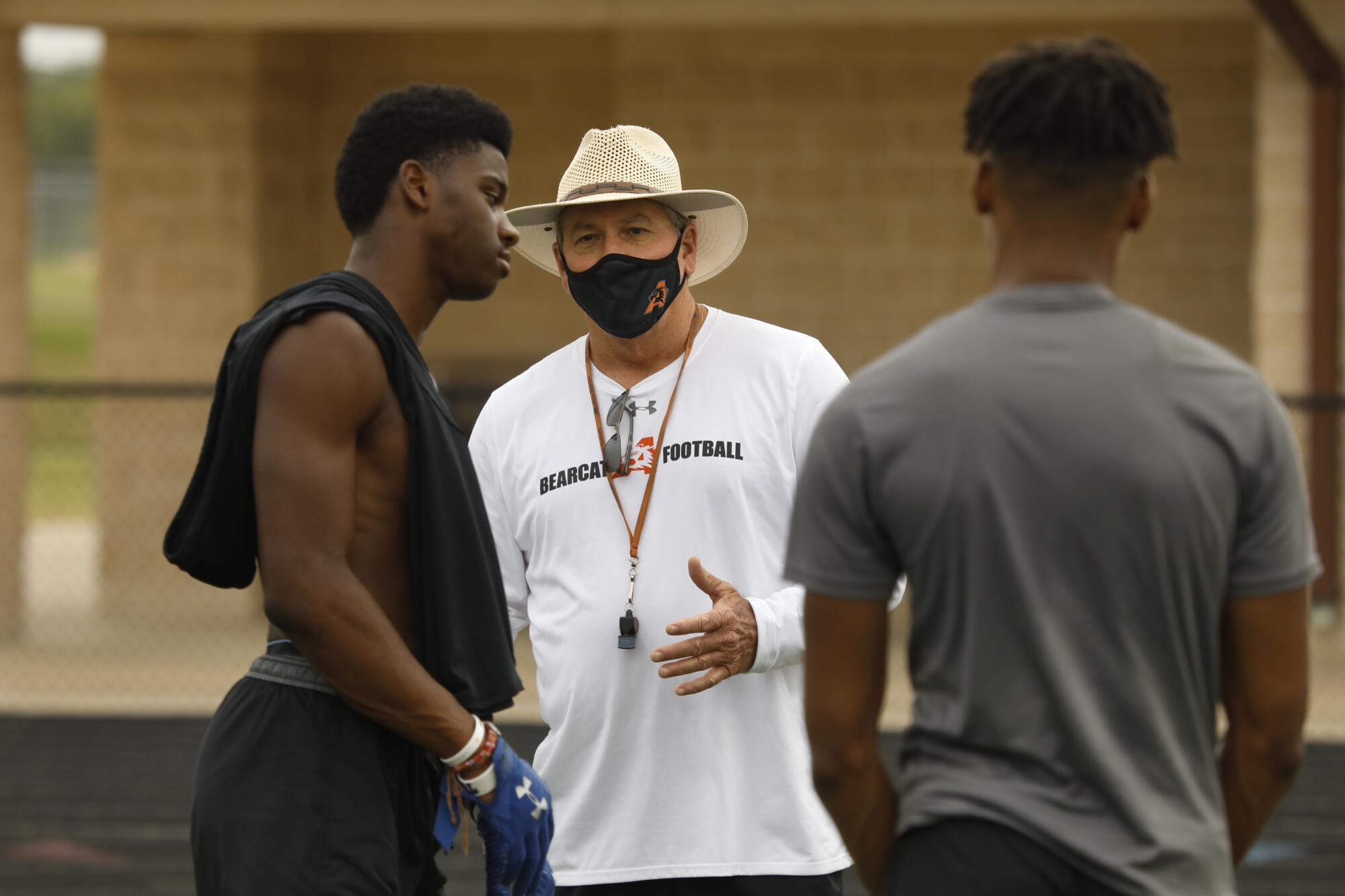
“I wish we were practicing for real,” Forman said, bemoaning the delay in full-contact play during a break in drills Monday, “but we can still get a lot of work in.”
During the break, players sat, stretched and chatted in clusters on the stadium’s artificial turf.
“This is the hardest part right here: Trying to keep them spread out,” Buchanan said.
He worries about his players most when they leave practice to mingle with friends and family. Several left Monday to have breakfast together at Aledo Diner, where they shed their masks to tuck into biscuits and gravy and other dishes listed as “Bearcat Specials.”
“I have a harder time getting the parents to wear masks,” Buchanan said.
The county surrounding Aledo has reported only 982 COVID cases and eight deaths. But about 20 miles east, the county surrounding Fort Worth reported 25,739 cases and 343 deaths. Some parents in the stands Monday wore masks. A few didn’t.
“It’s scary, but I mean, what can we do? Life still goes on. We can’t let this COVID stop us.”
— Tiffany Allen, a patient care tech with two sons on the team
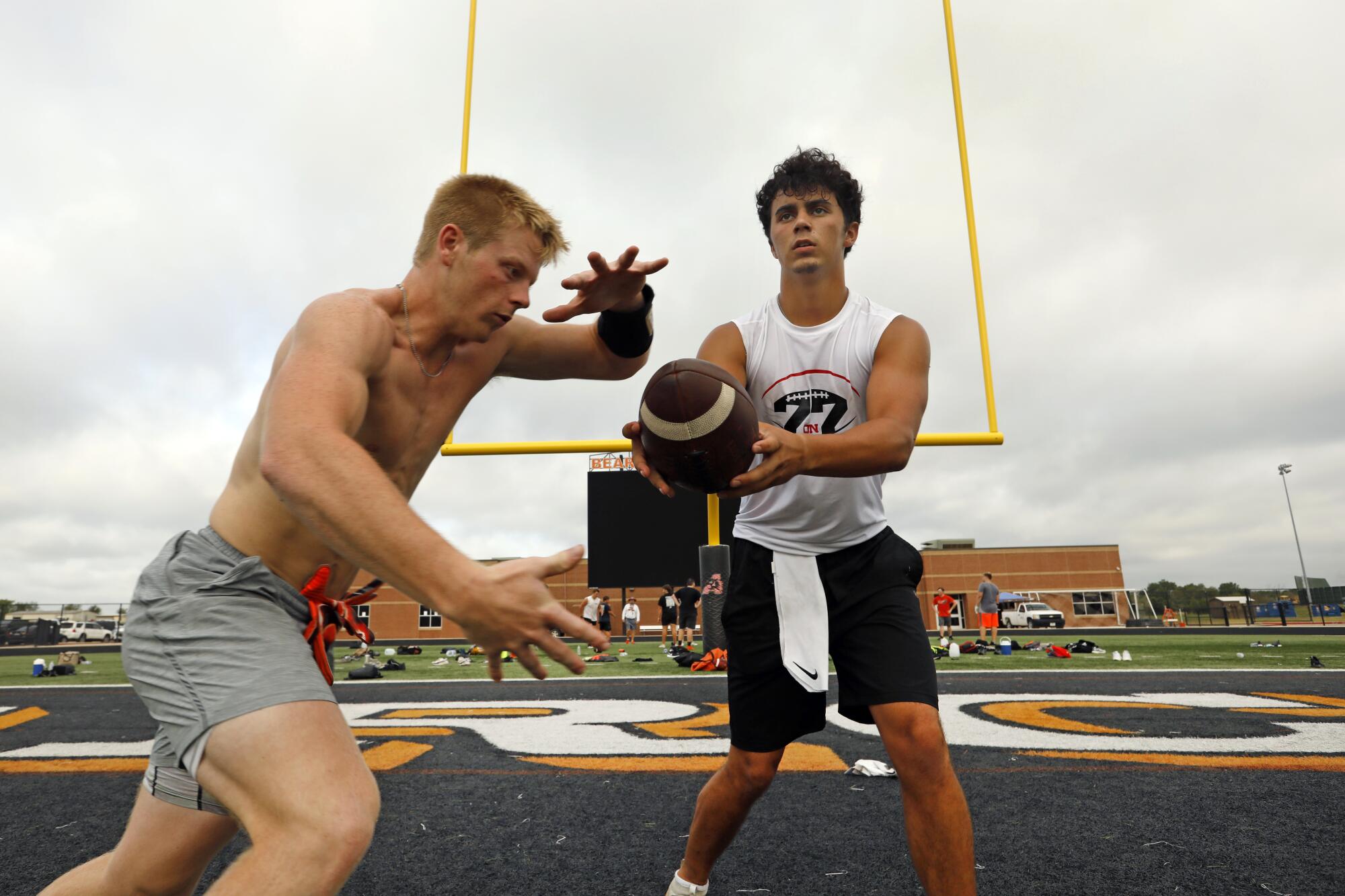
Parents said they worried the new pandemic restrictions will hurt not just their sons’ play, but also their college prospects. Many of Aledo’s 65 varsity players, including 42 seniors, have spent years preparing for this season. Others moved to Aledo for the chance to join the team. Some have already committed to powerhouse teams like Louisiana State University.
“I really wish they would have left it shut down longer and kids would have had a clearer understanding if they’re playing or not,” said Carlos Williams, 44, who works at a freight business and came to watch his 17-year-old son, a linebacker, practice.
Williams said he was concerned that players’ families might get sick.
Others disagreed.
“I would have preferred just do business as normal,” said Aaron Valencia, who didn’t wear a mask as he watched his son Eli train to play safety. “I’m not worried about the COVID. It’s good to have these kids out here.”
Valencia said he was laid off from his job as a manager at a chemical company due to the pandemic.
“I know more people who have been laid off than have COVID,” he said.
Sitting in the stands nearby, Calvin Flinta, a U.S. Army veteran who works at the Veteran’s Administration, said he also knows a lot of people who’ve lost their jobs.
“At least we have football,” said Flinta, 48, whose son Logan is a senior hoping to score a football scholarship like his older brother did at the University of Arizona.
“This is his only chance to prove himself,” Flinta said.
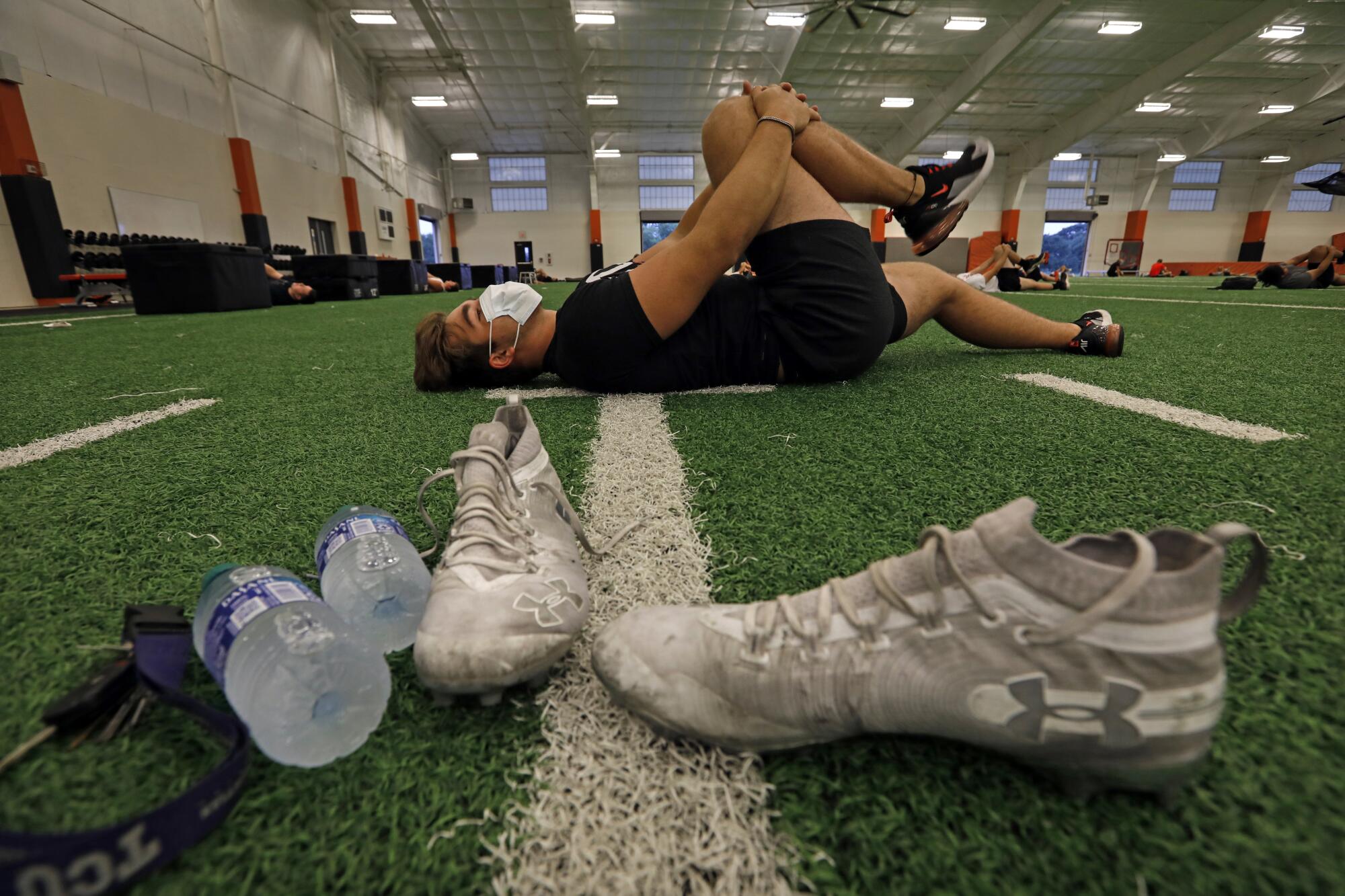
Parents said delaying the season made them feel safer. But they debated other changes, like limiting attendance. Many were season ticket holders who hadn’t missed a game in years. Among those watching practice was a man whose son hadn’t even made the team yet — he was only 12, but already played slot, corner and running back.
Tiffany Allen’s eldest, Bryan “B.J.” Allen, 15, is a rising junior who plays safety, while her younger son Jaden Allen, 14, is playing corner as a freshman. Allen, 36, a patient care tech who works nights, plans to attend games just as she did last year.
“I’ll be there front and center with my mask on,” she said. “It’s scary, but I mean, what can we do? Life still goes on. We can’t let this COVID stop us.”
As the varsity players left the field Monday, they replaced their masks and headed for the parking lot. The JV squad and dozens of middle schoolers filed past them onto the field, hoping to prove themselves as morning clouds cleared and the sun appeared, hot and unforgiving.
More to Read
Sign up for Essential California
The most important California stories and recommendations in your inbox every morning.
You may occasionally receive promotional content from the Los Angeles Times.

